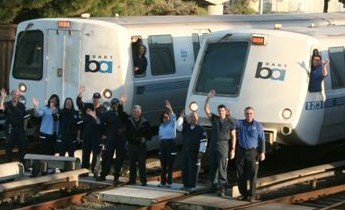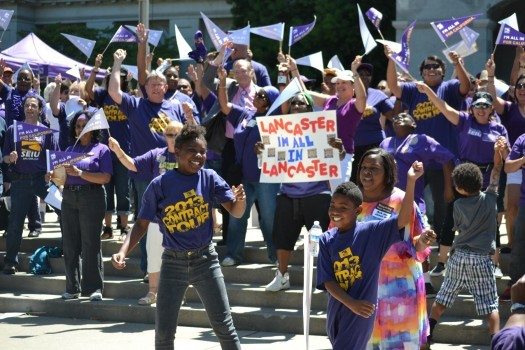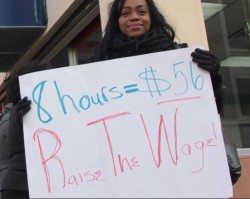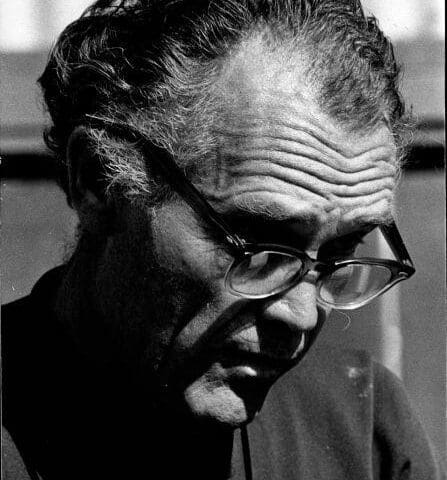

(This article first appeared in the Sierra Club journal Sierra and is republished with permission.)
The late-June weekend heat wave comes on as predicted. By 10 a.m., it’s 90°F in a South Los Angeles parking lot where scores of local residents have gathered, lured by community leaders and the Los Angeles Department of Water and Power (DWP). Over the hum of the crowd, speakers take the stage for this Green the Block workshop: community organizers, environmentalists, labor union leaders and local politicians, all talking about the changing climate, the sputtering economy and the need to use less energy. It’s important stuff, but not particularly riveting. Meanwhile, it keeps getting hotter. By the time Ron Nichols, the utility’s general manager, takes the stage, the sun has chased people under canopies at either side of the lot and the chairs in front of him are almost empty.
» Read more about: Repowering Los Angeles One Block at a Time »


Conservative Republicans have lost their fight over the shutdown and debt ceiling, and they probably won’t get major spending cuts in upcoming negotiations over the budget.
But they’re winning the big one: How the nation understands our biggest domestic problem.
They say the biggest problem is the size of government and the budget deficit.
In fact our biggest problem is the decline of the middle class and increasing ranks of the poor, while almost all the economic gains go to the top.
The Labor Department reported Tuesday that only 148,000 jobs were created in September — way down from the average of 207,000 new jobs a month in the first quarter of the year.
Many Americans have stopped looking for work. The official unemployment rate of 7.2 percent reflects only those who are still looking. If the same percentage of Americans were in the workforce today as when Barack Obama took office,
» Read more about: Conservatives Are Crying – All the Way to Victory »


(Note: Jason Motlagh writes about the lack of compensation for the families of Rana Plaza victims for The Nation, where this post first appeared. Republished with permission.)
This week United Students Against Sweatshops (USAS) is holding demonstrations at more than 30 colleges and universities across the country as part of an International Week of Action to End Deathtraps commemorating the six-month anniversary of the Rana Plaza building collapse in Bangladesh.
Students and workers are demanding that apparel brands who produce apparel for U.S. universities sign on to the Accord on Fire and Building Safety in Bangladesh, a legally binding agreement now signed by over 100 brands and retailers, promising greater protection for workers and a voice for unions in addressing deadly working conditions. To date, not a single college-producing apparel company has signed the agreement. Bangladeshi unions are also holding demonstrations at the site of Rana Plaza collapse.
» Read more about: Students: School Clothiers Must Sign Fire and Safety Pact »


Faye Steuer is a former psychology professor living near Charleston, South Carolina, who spent much of her career researching how violence on television affects children. Over the years, Steuer learned about the inner workings of the media business and stumbled upon what she believes to be an even bigger problem.
“As I did that, I became more and more aware of how the consolidation of media ownership was really having an impact on democracy, and that worried me even more than the impact of [TV] violence on children,” Steuer tells Truthout.
A historic wave of corporate media consolidation is changing the landscape of America’s most utilized news source – local TV news. Media reformers say the consolidation diminishes the public’s access to information and, in turn, harms our democracy.
In the first eight months of 2013, 211 full-power broadcast stations changed hands, the highest number in a decade, according to a recent report by media watchdog group Free Press.
» Read more about: Remote Control: How Big Media Uses Shell Outfits to Expand »


“If only they would run government like a business,” goes a familiar conservative lament, the gist of which equates “business” with the kind of furious efficiency that rewards honest, hard work in both industry and the animal kingdom. But now a new study shows what actually happens when elected officials hand over the keys to the private sector and ask it to run the services that society depends on.
Suddenly, according to Creating Scandals Instead of Jobs, the book of Ayn Rand fairy tales is shut and a dangerous reality asserts itself. The study, conducted by Good Jobs First, discovered an especially dizzying level of corruption in those enterprise and commerce agencies charged with expanding state economies and creating jobs. (Californians will remember how, until it was recently changed, their own Enterprise Zone program helped wreck the middle class by rewarding businesses for downsizing their work forces and lowering wages.)
Among Scandals/Jobs’ findings about so-called PPPs (public-private partnerships):
» Read more about: Public-Private Partnerships: Schools for Scandal »


As our country’s economy has limped along from one crisis to another over the past several years, the impact of state and federal austerity measures on communities has exposed our troubling national priorities. A new report by the Center on Budget and Policy Priorities showed that despite the Great Recession technically ending in 2009, schools have yet to return to pre-recession spending levels, and in some states the cuts reach up to 20 percent per pupil. These drastic cuts have become the norm as communities in states that have resorted to austerity to put out short-term fires must now cope with the fallout from such measures.
And then the government shut down.
So on top of underfunded schools, we had Head Start agencies on the chopping block,long-term WIC funding up in the air, furloughed workers flooding unemployment offices and the nation on the brink of defaulting on our debt yet again.
» Read more about: California’s Bold Alternative to Education Cuts »


As classical music piped through the audio system at the McDonald’s in downtown Seattle on a recent day, customers devoured hamburgers while sitting in maroon-colored seats and at tables bathed in warm colors.
Customers lined up at registers, exchanging cash and credit cards for an assortment of hamburgers, fries and drinks.
These days, many fast-food employees at large restaurants are hoping that more than just hamburgers, tacos, fried chicken and sandwiches will be exchanged across restaurant counters.
They are hoping that higher hourly wages will come their way so they won’t have to apply for nearly $7 billion in U.S. taxpayer assistance each year to offset what they say are wages too low to support themselves and their families.
See infographic, below right, in Just the Facts.
Researchers at the University of California at Berkeley announced last week that the median national wage for front-line fast-food workers is $8.69 per hour and that the $7 billion in taxpayer support amounts to a subsidy for a $200 billion industry.


Chi-Town, the Windy City, Chicagoland – whatever you want to call it, the city just made a bold move to encourage good American jobs. On October 18, the Chicago Transit Authority (CTA) for the first time asked companies vying for a $2 billion contract to manufacture 854 rapid transit cars to disclose their plans to create American jobs and opportunities for American workers. CTA’s addendum to its Invitation for Bids encourages companies to develop comprehensive American jobs plans and follow through to create them if awarded the contract – a move that could create as many as 20,000 good American manufacturing and related jobs, according to University of Massachusetts, Amherst economists.
Jorge Ramirez, President of the Chicago Federation of Labor celebrated the decision, saying, “We applaud Mayor Emanuel and the CTA for taking a lead role in bolstering Chicago’s economy and creating jobs. We urge manufacturers to work in partnership with the CTA to create quality manufacturing jobs here in Chicago and around the U.S.”
CTA’s adoption of the Jobs to Move America framework demonstrates the growing muscle of the coalition of community,
» Read more about: Chicago Gets Rolling Toward Good American Jobs »


A tentative agreement between striking Bay Area Rapid Transit workers and BART management has ended the employees’ four-day strike. The new contract must be approved and ratified by members of SEIU 1021 and ATU 1555, the rail system’s two largest unions.
Last night, in a statement released by Local 1021, John Arantes, BART Chapter President of that local announced:
“Tonight the hard working men and women who keep the Bay Area moving, can go back to work making BART the most efficient and successful system in the country.”
Added Des Patten, President of SEIU 1021’s BART Professional Chapter:
“Let us be clear that our commitment to improving the safety at BART doesn’t end with these negotiations. With this agreement, we expect that General Manager Grace Crunican will continue the dialogue with its unions on working conditions and health and safety at BART.”
According to SFGate,


After months of negotiating in bad faith, Bay Area Rapid Transit (BART) management Thursday night left BART workers no other option but to go on strike. What a shame. It didn’t have to come to this.
With all the misinformation swirling about on the BART strike, there are a few things to clear up.
Here are the three things you need to know about the BART strike (h/t to Pete Castelli of SEIU 1021):
1) The strike is NOT about wages or benefits. BART workers made concession after concession on the economic proposals with the goal of averting a strike. BART workers and management agreed to a deal yesterday on wages, health care and pensions.
2) BART management pulled the rug out from under workers at the last minute by insisting on new workplace rules that infringed on the rights of workers.
» Read more about: Three Important Facts About the BART Strike »


(Labor 411, the group dedicated to promoting products and services that carry the union label, offers a couple of spooky recipes for Halloween treats that are reposted below.)
According to a recent survey, more Americans than ever will be getting in the Halloween spirit this year. Halloween has now become one of the fastest growing and most widely loved holidays in America. We here at Labor 411 love Halloween because it’s all about the candy — and so much of it is union made! You can get a complete list of union-made candy by clicking here.
Sometimes buying union candy can be confusing, mostly to do with what we call “bridge companies,” which can make some of their products both in the U.S. and out of the country. So if a company is listed in our directory but you’ve heard they make candy out of the country,


Poulinna Po had just walked into the Long Beach offices of Khmer Girls in Action when she got the news: Governor Jerry Brown had vetoed Assembly Bill 1263, which promised to expand the number of state medical translators. The measure had seemed to offer a straightforward solution to the dilemmas faced by California’s estimated three million Medi-Cal beneficiaries who speak little or no English when they talk to Anglophone doctors or medical staff.
One tragic example of this kind of patient-doctor miscommunication occurred in 2008 at Los Angeles County General hospital, when a pregnant Maria Guevara, who only spoke Spanish, was prescribed an abortion-inducing drug — which she then took, believing it to be part of her prenatal care. She lost her baby.
“That lack of communication between the doctor and me has changed my life forever, ” Guevara would later bitterly recount.


When the town of Sandy Springs, Georgia, spun-off from Fulton County and established a brand new government, it didn’t sign a Declaration of Independence; it signed a contract.
The 100,000-person town entered into a five-year contract with the for-profit management company CH2M Hill to operate almost all of the town’s services: running trash collection, and street cleaning, and wastewater management, and even security and administration for the courthouse. A for-profit company, rather than public officials and public employees, would be in charge of providing all “public” services except for fire and police departments. CH2M Hill employees, wearing Sandy Spring uniforms and driving trucks with Sandy Spring logos, even enforced municipal ordinances like grass-cutting and parking regulations.
Sandy Springs, an affluent suburb of Atlanta — home to Herman Cain, professional sports players, and the woman who voiced iPhone’s Siri — had been fighting for years to spin-off from Fulton County,
» Read more about: How CH2M Hill Is Outsourcing the Future »


Now is the time to lance the boil of Republican extremism once and for all. Since Barack Obama became president, the extremists who have taken over the Republican Party have escalated their demands every time he’s caved, using the entire government of the United States as their bargaining chit.
In 2010 he agreed to extend all of the Bush tax cuts through the end of 2012. Were they satisfied? Of course not.
In the summer of 2011, goaded by an influx of Tea Partiers, they demanded huge spending cuts in return for raising the debt ceiling. In response, the President offered an overly-generous $4 trillion “Grand Bargain,” including cuts in Social Security and Medicare and whopping cuts in domestic spending (bringing it to its lowest level as a share of gross domestic product in over half a century).
Were Republicans content? No. When they demanded more,


It’s easy to be pessimistic about the future these days. Tea Party extremists are threatening to push our federal government into default. Federal immigration reform is on the back burner until the shutdown and debt ceiling messes are sorted out. In a host of states, anti-worker governors are hell-bent on gutting workers’ rights while giving more power to corporate special interests.
But in California, a decidedly different story is playing out. The end of the legislative session here brought huge gains to workers and their families that boost our state’s economy and bolster the middle class.
With the federal minimum wage stuck at $7.25, Governor Brown signed AB 10, taking California’s minimum wage to $10 per hour by January of 2016, a 25 percent wage increase for low-wage workers in the state. While immigration reform is stalled in D.C., Governor Brown signed a slew of bills to protect immigrants and ensure greater inclusion.
» Read more about: It Was a Very Good Year: California Labor Looks Back »


The latest chapter in the efforts to dismantle California’s public-sector retirement system was officially opened Tuesday when San Jose Mayor Chuck Reed submitted paperwork that begins the process of qualifying his latest pension initiative for next year’s statewide ballot.
The filing brings to a climax weeks of speculation about the timing of the proposed law after Frying Pan News first confirmed rumors of its existence when Gary Cohn published a leaked draft version last month and when we reported Reed’s remarks, delivered before a Hoover Institution conference on pensions, that indicated he was uncertain whether he would file for the 2014 or 2016 ballot. Now Reed is certain: It’s 2014 or never.
Called the Pension Reform Act of 2014, the measure seeks to rewrite California’s constitution in order to bypass its current guarantees of public pension rights. If passed by voters,
» Read more about: There Will Be Blood: Chuck Reed Files Pension-Cutting Ballot Initiative »


A spirited group of community, religious and labor activists gathered outside a Western Avenue McDonald’s today to connect their efforts to raise fast-food workers’ earnings with a new study disclosing how dependent such low-income employees are on public assistance.
Among the facts of low-income life that were dug up by the University of California, Berkeley Labor Center report:
“We’ve seen McDonald’s clown the workers and we’ve seen Ronald McDonald – did you like that?” the Reverend Lewis Logan asked at the top of the rally.
» Read more about: McDonald’s Rally Echoes UC Berkeley Fast-Food Study »


A new study released today by the University of California, Berkeley Labor Center estimates that taxpayers contribute around $7 billion annually to provide basic social service benefits and health care to families of America’s expanding ranks of low-wage fast-food workers. The study, Fast Food, Poverty Wages: The Public Cost of Low-Wage Jobs in the Fast-Food Industry, also found that:
» Read more about: Report: Fast-Food Workers Have One Foot in Poverty »


California State Senator (and former United Farm Workers activist) Bill Monning is sponsoring an effort on behalf of a broad coalition of activists and legislators urging Governor Jerry Brown to nominate Fred Ross Sr. for the California Hall of Fame. Ross, who mentored Cesar Chavez, Dolores Huerta, Eliseo Medina and multiple generations of great activists, was arguably the leading community organizer of his time. Although Ross died in 1992, his influence over current Latino voter outreach and labor organizing strategies remains strong. A national campaign began earlier this year to get President Obama to award him the posthumous Presidential Medal of Freedom.
Fred Ross Sr. spent 60 years in California working to bring social and economic justice. But he is not in the state’s Sacramento-based Hall of Fame, an omission that Senator Monning and others now hope Governor Brown will remedy.
On September 6, 2013, Monning, along with Senate leader Darrell Steinberg and many of their Senate colleagues,
» Read more about: Fred Ross Sr., California Hall of Fame Candidate »


Investigative reporter Gary Cohen recently appeared on radio station KPFK’s David Feldman Show to discuss the strange liaison between the Pew Charitable Trusts and the libertarian Laura and John Arnold Foundation. Cohn had written a piece for Frying Pan News linking the respected research organization with the public-pension-cutting agenda of John Arnold, a billionaire hedge-funder. Cohn also broke a story about a proposed state ballot initiative that would change California’s constitution in favor of gutting the retirement plans of state and municipal employees.
Listen here to a segment of Feldman’s show for a quick rundown of the Pew-Arnold alliance and what’s behind the move to cut funding for public pensions.
» Read more about: Radio: Gary Cohn Explains Pew-Arnold Alliance »